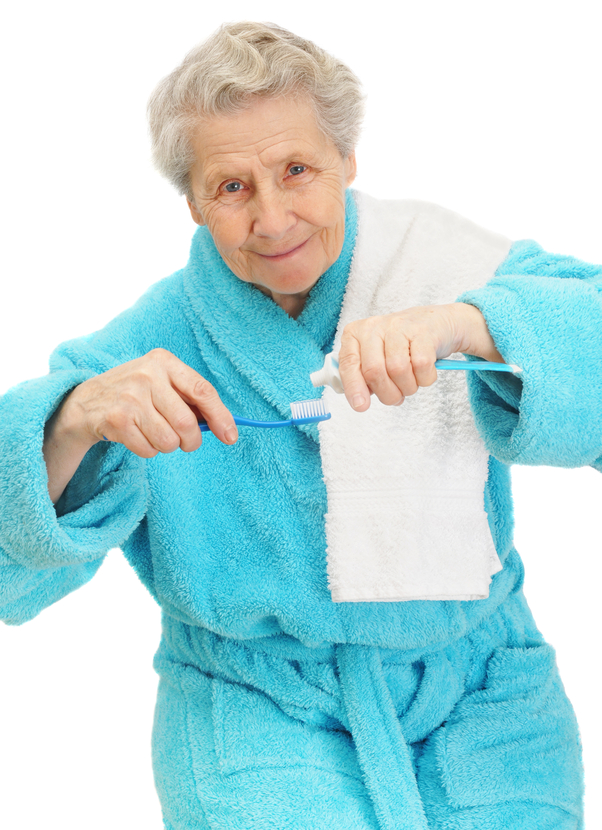 Life has this habit of taking a toll on our teeth. After decades of eating, drinking, and numerous other activities, once we get to a later stage of life, the state of our teeth can be less than ideal. In fact, the state of our teeth can become problematic. It’s not uncommon to see teeth replaced with dentures or other similar solutions. This article by Dr. Gabrielle Mahler brings up the excellent point that oral healthcare tends to take a backseat to other health concerns. Dental care and oral health in general is relegated to a lower priority position and often, it’s completely understandable.
Life has this habit of taking a toll on our teeth. After decades of eating, drinking, and numerous other activities, once we get to a later stage of life, the state of our teeth can be less than ideal. In fact, the state of our teeth can become problematic. It’s not uncommon to see teeth replaced with dentures or other similar solutions. This article by Dr. Gabrielle Mahler brings up the excellent point that oral healthcare tends to take a backseat to other health concerns. Dental care and oral health in general is relegated to a lower priority position and often, it’s completely understandable.
As Dr. Mahler’s article points out, one obstacle seniors face is mobility. It might not always be a significant mobility issue, but even minor difficulties can create a lead to large challenges and taking the time to go out to a dental clinic may become something that requires considerable effort.
Of course, it goes beyond mobility. There are several other health issues and circumstances that can have a negative effect on our teeth and in oral health in general. Arthritis, for instance, can make brushing and flossing difficult or depending on the severity, downright impossible.
Memory-related ailments, such as dementia or Alzheimer’s can have a varying effect on teeth. In the earlier stages of these diseases, it may be a matter of forgetting to brush, but over time, those affected may simply lose their ability to clean their teeth, along with the ability to keep their health up in general, requiring assistance.
Additionally, several medications and dietary supplements are known to damage teeth. In some cases, the damage is directly caused by the consumption of the medication or supplement. Vitamin C and antacids are a great example. This applies to the chewable or drinkable variations that come into direct contact with teeth. Vitamin C in particular can be problematic due to high acid content (ascorbic acid), but it’s easily overcome by choosing a non-chewable version.
Other types of medications can have an indirect effect on teeth through common side effects. Dry mouth is one of those common side effects that are caused by a significant number of drugs ranging from blood pressure medication to asthma medication. Because of this, dry mouth is often attributed to being one of the leading causes of tooth decay in seniors.
Going back to Dr. Mahler’s points, in-home dentistry would be hugely beneficial for seniors and others who simply can’t visit a dentist every six months. One of the biggest hurdles is finding a qualified dentist who provides in-home care.
Right now, I don’t personally know a single dentist who explicitly provides in-home care. However, it’s not something that comes up frequently. It can vary greatly by area and demographics (as dentists love to set up shop in suburban areas populated more heavily with younger families). They don’t have many patients (or potential patients or caregivers) who ask them if they provide this type of care. At the same time, I do know dentists who would gladly provide in-home services, if requested.
There are dental care providers who do offer specialized in-home care, but they aren’t common and may take a little searching to find, If you’re a caregiver who cares for an individual who is in need of dental care, but it’s difficult to get to a clinic, it never hurts to ask if the dentist is willing to make a house call and I do recommend it.
Harmon Pearson recently began work on a post-graduate degree in Dental Science, with the goal of pursuing a doctorate degree. He also blogs with Dentist Call Me about the experience and offers insight into dental care and health issues.
image credit: Deposit Photos
LEARN TO LOVE YOUR LIFE AGAIN
 Do you feel like you need to hit the REFRESH button on your life? Download our free guide and begin to create your best life yet!
Do you feel like you need to hit the REFRESH button on your life? Download our free guide and begin to create your best life yet!



as you said there should be oral care programs for seniors, the dentists should make house visits ,it would be much easy for them , we need to protect our elders an offer them an great health care system
Seniors dental care must have a wide variety of local service that they can look into. Seniors must be given a privileges
Thank you for talking about the importance of maintaining teeth care when you are an older person. It makes sense that after a lifetime of using your teeth they would not be in the best conditions. It makes sense that choosing a doctor who can help you keep your oral health can help you make sure you have little to no discomfort.